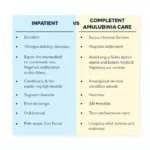When choosing a private pay child care service, you want to ensure you’re entrusting your child’s well-being to a safe and nurturing environment. While most providers operate ethically and responsibly, there may be instances where reporting concerns becomes necessary. This comprehensive guide will walk you through the steps on how to report a private pay child care service, empowering you to advocate for your child’s safety and well-being.
Understanding the Importance of Reporting
Reporting concerns about a private pay child care service is crucial for several reasons:
- Protecting Children: Your report can help prevent potential harm to other children attending the facility.
- Ensuring Accountability: Reporting holds providers accountable for maintaining safe and appropriate care standards.
- Improving Quality of Care: By addressing concerns, you contribute to improving the overall quality of child care services in your community.
When to Report a Private Pay Child Care Service
It’s essential to report any situation where a child’s safety, well-being, or legal rights are compromised. Common reasons for reporting include:
- Suspected Child Abuse or Neglect: Any signs of physical, emotional, or sexual abuse, as well as neglect, should be reported immediately.
- Unlicensed Operation: Operating a child care service without the necessary licenses is illegal and poses risks to children’s safety.
- Unsafe or Unsanitary Conditions: Environments that are unclean, hazardous, or lack proper hygiene practices put children at risk.
- Inadequate Supervision: Insufficient staff-to-child ratios or inadequate supervision can lead to accidents and injuries.
- Violation of Contractual Agreements: Failure to adhere to the agreed-upon terms and conditions outlined in the contract warrants a report.
Steps to Report a Private Pay Child Care Service
Follow these steps to effectively report a private pay child care service:
-
Gather Evidence: Document specific incidents, dates, times, individuals involved, and any witnesses. If possible, take photos or videos as evidence.
-
Attempt Internal Resolution (If Appropriate): Depending on the severity of the concern, you may first try addressing the issue directly with the provider. This could involve a conversation with the caregiver or director.
-
Identify the Appropriate Reporting Authority: Contact your state’s child care licensing agency or department of social services. They are responsible for investigating complaints and enforcing regulations.
-
File a Formal Complaint: Most agencies have online forms or hotlines for reporting. Provide detailed and accurate information when filing your complaint.
 Filing a Child Care Complaint
Filing a Child Care Complaint
- Follow Up: After filing your report, follow up with the agency to check the status of your complaint and inquire about any further actions being taken.
Protecting Yourself and Your Child
- Keep Records: Maintain detailed records of all communications, including dates, times, names, and outcomes of conversations or meetings.
- Seek Support: Reporting child care concerns can be emotionally draining. Reach out to friends, family, or support groups for assistance.
- Know Your Rights: Familiarize yourself with your state’s child care laws and regulations to understand your rights as a parent.
Conclusion
Reporting a private pay child care service is essential for ensuring the safety and well-being of children. By understanding the importance of reporting, recognizing warning signs, and following the appropriate steps, you can help create a safer and more accountable child care environment for all children. Remember, your voice matters, and your actions can make a difference.
Frequently Asked Questions
1. What if I’m afraid of retaliation for reporting?
Retaliation against those who report child care concerns is illegal. Report any instances of retaliation to the licensing agency.
2. Will my identity remain confidential if I file a report?
Most states allow for anonymous reporting, but it’s essential to check your state’s specific laws and procedures.
3. What happens after I file a report?
The licensing agency will investigate the complaint, which may involve site visits, interviews, and record reviews.
4. How long does the investigation process take?
Investigation timelines vary depending on the complexity of the case and the agency’s workload.
5. Can I be sued for reporting a child care provider?
Filing a report in good faith protects you from legal action.
For more information about child care resources and support, you can visit our article on what care can social services provide. Our team is dedicated to providing you with the information and guidance you need to make informed decisions about your child’s care. If you require further assistance, don’t hesitate to contact our 24/7 customer support team via WhatsApp: +1(641)206-8880 or email us at [email protected].

